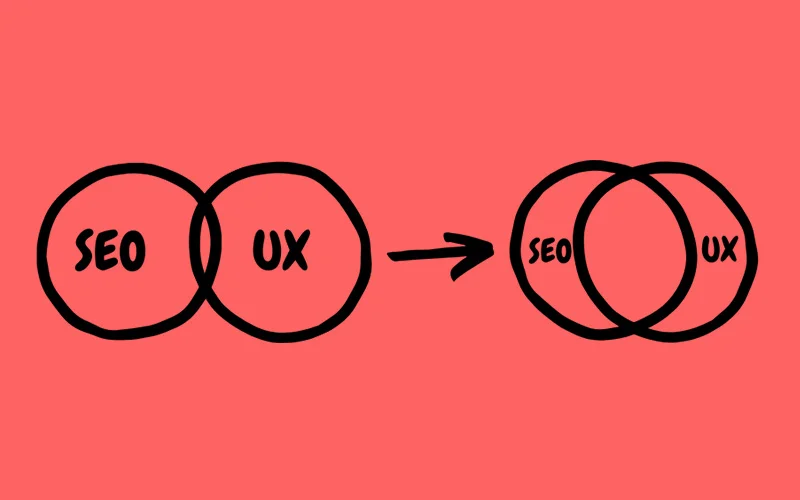We all share the objective of increasing content visibility and engagement. Search Engine Optimization (SEO) plays a significant role in achieving these goals.
With accurate keywords and well-written content, you could dodge all the faulty algorithms of search engines and make your webpage more engaging.
UX is the key strategy in SEO to rank up your content considering the changing algorithms of search engines. Both these things combined serve as a deal to appealing content.
In this guide, I’ll familiarize you with the influence of UX on SEO and how the former can be used to up your SEO game.
What Is User Experience (UX)?
UX determines how individuals interact with a web page and whether it is user-friendly or not. It focuses on the planning aspect of the website interface as to how a user can easily navigate through the webpage and make their experience feel like a breeze.
How Are UX and SEO Related?

In the words of Frank Chimero, “People ignore design that ignores people.” This gives us an idea of how important a website experience is.
Imagine having the perfect content, but your website is too much of a hassle. Your users will, sooner or later, stop using it as it is not easy enough to open and understand.
With reference to a Clutch survey in 2021, 94 percent of people were of the view that easy navigation of a website is extremely crucial. Hence, UX is extremely important as it directly impacts engagement on a website and search engine rankings.
The layout of the webpage, easy navigation, engaging content, and visuals of the site are a few aspects of UX that impact user retention and make your website a favorite reading spot for them. If these points are not taken into consideration, your users are likely to stop visiting your website.
If UX and SEO complement each other well, it will result in higher engagement, less bounce rate, social shares, and much more. Continue reading as I explore how UX can benefit SEO in higher search rankings.
High Engagement
Search engines measure the time spent on a website, and according to that, they rank whether the content or UX is high level or not. If the website is user-friendly and satisfies the user experience, the user is more likely to surf the page and visit more pages on the same website.
This results in longer engagement on the content, letting the search engine know that there is quality content and an easy-to-navigate website that can rank up high on search engines.
Less Bounce Rate
The bounce rate reflects how quickly or late a user leaves a site. If a user leaves a site just after visiting one page, it can result in a high bounce rate.
A high bounce rate may lower your search engine ranking, thus making it important to make the website user-friendly for a great experience.
So, you want your bounce rate to be less at all costs. This can be a make or break for your rankings in the search engine.
Social Shares
When a user finds your content well-written and easy to get through, they will likely share it with others as well. This helps in more traffic on the webpage, which eventually ranks up on search engines.
How Can Your UX Design Improve Your SEO?

Your UX design must align with your site and company’s vision. It should be well thought of as it has a direct relation to SEO ranking.
The search engine algorithms are cruel, and they change rapidly. By having a great UX design, you can have recurring users on your website, which leads to high retention on the page.
Some factors you should consider for an excellent user experience are the loading speed of the page, how it is designed, how responsive it is, and how the URL is structured.
Website Speed
This is one aspect that is crucial for user experience. If a page takes ages to load, the user will eventually leave it and move to another website altogether.
It is a rather frustrating experience and can lead to a high bounce rate, which impacts the SEO negatively. You can avoid it by compressing images and videos, increasing response time by upgrading hosting, and using minimal server load.
Design and Layout
One cannot emphasize this enough on how important the layout of your website is. If it is well-designed, your user engagement will boom, resulting in a lower bounce rate and a high rank on search engines.
Make sure that your user can easily navigate through the site and that it is responsive, visually appealing, reading-friendly, and accessible on all platforms for everyone.
URL
Having an easy URL is also an important factor to consider. It should be clear and concise for the readers and search engines to decipher the content of the website. Having keywords in your URL can give a good boost to your SEO rankings.
With these factors in mind, your UX design will be effective, and you will be able to visibly notice improved engagement influencing your search rankings.
FAQs (Frequently Asked Questions)
User Experience (UX) is highly important in SEO as it creates an impact on user retention, engagement, and responsiveness. If the user does not understand the website, they will not read the content, however engaging it may be.
User experience is the key to SEO. If the design of the website is user-friendly, there will be fewer bounce rates, which can rank high in search engines.
UX can be used to improve SEO in different ways. You can structure the URL efficiently, work on the layout of the page, make it responsive, and work on the loading speed.
Takeaways
While SEO is competitive, it is not impossible to rank your content up in the search engines. The key to success in this is to have a good interface that gives users a great experience along with quality content that helps them.
If you can give a 10/10 user experience to your readers, there is no stopping your content from being ranked up. I hope this blog has shed light on the importance of optimizing UX for your website’s success.
If you want to dive deeper into the world of SEO or have more questions about UX, feel free to explore our other articles or get in touch with our experts for guaranteed seo services.
Check out more blogs on SEO:







